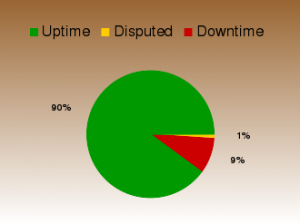 Don’t look at me like that. The question gets sort of interesting, if you’ll just stare at it (instead of me) long enough.
Don’t look at me like that. The question gets sort of interesting, if you’ll just stare at it (instead of me) long enough.
Still not interesting. Well, keep trying.
…I swear, some people just have no attention span at all.
All right, I admit it: I didn’t think there was much to it, way back when we decided to mess with this stuff. So, what are we talking about?
If my website goes down, I want to know about it. I might need to take some immediate action, or I might just want to record how often it happens to inform some future decision. So, being a software guy, I wrote an app that’ll tell me.
Like hell.
Scarecrow gives it a good shot. It checks fairly regularly to see whether a site is responding. It tries three times before it decides there may be a problem. If something’s going on, it checks the site from several different locations. It stores information about outages in a database.
Sounds pretty good. So how come I’m not happy?
Because there are things we call “disputed” outages. Suppose a Scarecrow agent in Los Angeles says a site’s down. Say Chicago agrees. But Dallas says it’s up. What’s that all about?
Simple: the web server itself is running (at least intermittently…oh, let’s assume the geographical stuff is real just for a minute). I therefore conclude that some internet problem that doesn’t affect Scarecrow’s agent in Dallas is getting in the way. So, no problem, right? The server’s up, and that’s what I (as a business owner) am paying for, and the rest is kinda like mosquito bites in Alaska: part of the price of doing business in the digital age (if you’re writing a blog entry from an off-the-grid cabin via laptop, tethered iPhone & two-stroke generator, that is).
But. What if the mysterious routing problem is caused by my internet hosting provider? Or if not caused by them, what if it’s caused by their provider? What if it happens a lot?
So a lot of disputed outages can mean something. After staring at the data we’ve gathered through our beta testing, I’ve decided we need to make specific error messages (rather than binary up/down info) available when customers download lists of their outages. [Edit 12/21/2011: Done.]
That’ll help, some. But what do I really want? Lots of customers! Lots more data! I want to start tying outage information from Scarecrow’s agents to a map of the internet. I want our customers to be able to figure out whether an outage was limited to their server, their hosting provider, or the state of Kansas.
I want to take all that data and put it where anyone who’s interested can see it. I want to publish information about hosting providers and what they really offer their customers. I’ll bet some of them wouldn’t like it. Others might be glad somebody finally noticed the differences between them and their competitors.
Scarecrow in general is about improving transparency, making commercial website development and hosting less of a black box to business owners. So it fits the mission, and all, but we’re nowhere near ready to publish this kind of information.
But I think we just might offer a very competitively priced uptime monitoring service that doesn’t require a subscription to Scarecrow’s other monitoring, backup & restore functions. If enough people bite, for whatever reason seems good to them, I think it will increase Scarecrow’s value to the business owners we see as our core customers.
Plus, it’ll be sort of cool. Nothing will happen right away, but if we get the data…watch out, internet! We’re gonna be peeking where you least expect it. ALL of us.
Got some related ideas? Think I’m full of it? Let me know.
It sounds good even if I don’t understand half of it!
[…] about 58.30963026 minutes. Yikes. I sent an email to my webhost with the dates and durations of the outages – hoping they could correlate the data with their data and isolate/fix the problem. They […]